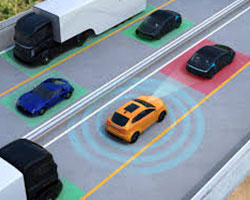<< Research Projects Overview << Year One Projects Overview
Modeling Adoption of Autonomous Vehicle Technologies by Freight Organizations

Assistant Professor, Department of Civil Engineering
University of Memphis
smishra3@memphis.edu
Professor, Department of Civil, Environmental and Geomatics Engineering
Florida Atlantic University
ekaisar@fau.edu
Proposal Summary and Objectives
Over the last few years, a rapid explosion of new technologies has created opportunities to address critical freight transportation challenges in urban, suburban and rural areas. Some examples of new technologies include expansion of e-commerce, 3-D printing, deliveries by unmanned aerial vehicles (UAVs or drones), and potential applications of automated and connected vehicles in freight transportation (e.g. truck platooning). These new technologies are also influencing consumer behavior and thereby reshaping freight supply chains at the urban, regional, and international level.
The autonomous vehicle technologies use new features including smartphones, vehicle fleet tracking (GPS, and location-based systems), sensors (V2V, V2I), enhanced imaging technologies, and other sources that arise from broader smart city initiatives. While the fully autonomous vehicle technology is yet to come, some of the new features are already available and some freight organizations are already adopting them. These new technologies and data sources are creating new challenges for freight planners in identifying the potential non-adopters and adopters. In addition, how the adoption will vary over time. Adoption methods available from consumer behavior research are mostly based on individuals and limited to organizations. The general adoption methods cannot be directly used in modeling adoption of freight organizations.
The main objectives of this project are to (1) review rapidly emerging technologies affecting freight planning and operations, (2) survey stakeholders to identify their inclination, and (3) outline future research steps necessary to meet future local agencies, MPOs and state DOTs freight planning and performance evaluation needs.
Funding Amount: $179,523
Status: Complete
Duration: Sept. 1, 2017 - Aug. 31, 2018